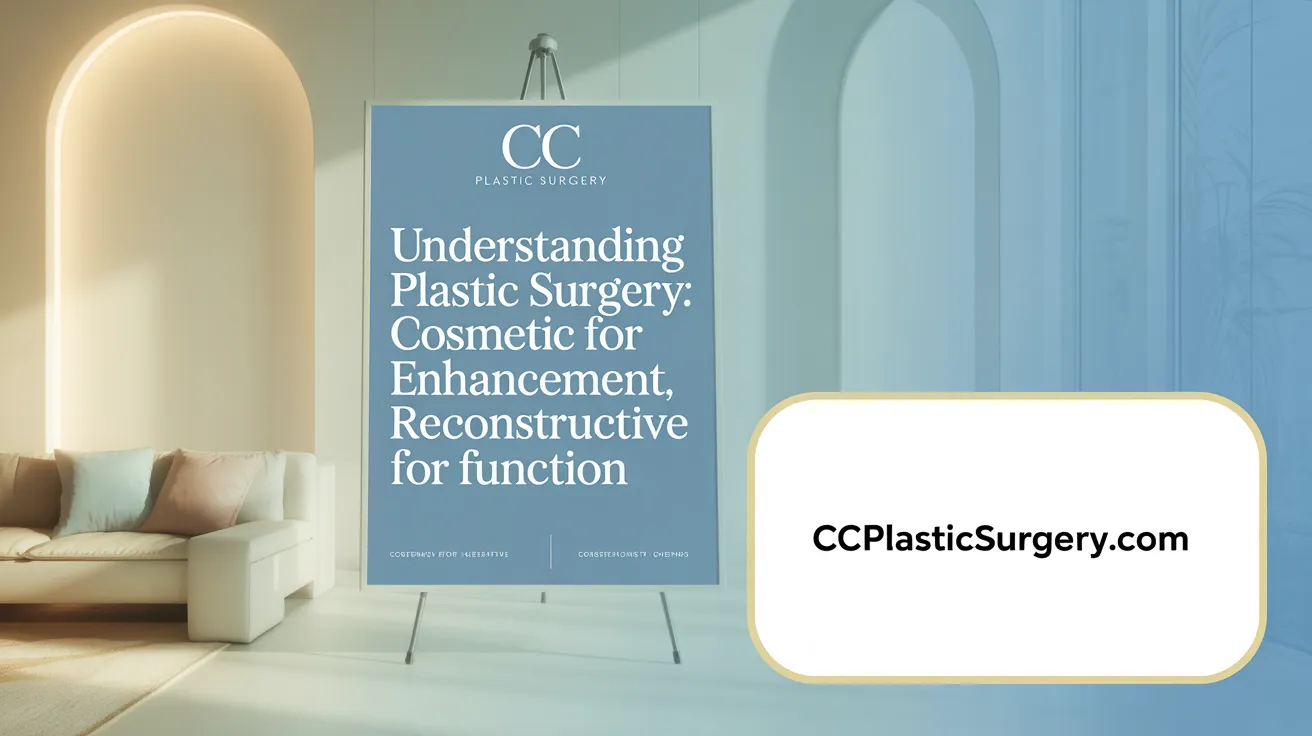
October 17, 2025
Breast Implant Size Guide: Find Your Perfect Fit
Discover our comprehensive breast implant size guide to choose the right CCs, profile, and shape. Make confident decisions for your ideal look!
Oct 17, 2025

Plastic surgery encompasses a broad spectrum of procedures aimed at restoring, reconstructing, or enhancing both appearance and function. Whether addressing birth defects, injuries, or aesthetic desires, the journey through plastic surgery begins with knowledge and clear expectations. This article explores key facets of plastic surgery — from qualifications and procedure types to recovery and patient safety — answering commonly asked questions to empower those considering these transformative procedures.

Plastic surgeons must complete extensive postgraduate education, typically five to seven years, that includes training in both general surgery and specialized plastic surgery. This rigorous training equips them with the expertise to handle complex reconstructive and cosmetic procedures. For more details, see Plastic surgeon training.
Board certification by the American Board of Plastic Surgery is a crucial mark of a surgeon's qualifications. It indicates that the surgeon has passed comprehensive exams and meets high standards in training and professional practice. This certification is the only one recognized by the American Board of Medical Specialties specifically for plastic surgeons. Learn more about American Board of Plastic Surgery certification.
Experience matters when selecting a plastic surgeon. Patients are advised to inquire about the surgeon’s track record, including the number of specific procedures performed. Reviewing before-and-after photos of past patients helps to set realistic expectations and evaluate the surgeon’s skill. See Surgeon experience and credentials for guidance.
Surgeries should be performed in accredited facilities, certified by nationally or state-recognized agencies such as JCAHO. Accredited centers comply with strict safety protocols, thereby minimizing risks during surgery. More information on Surgical facility accreditation is available.
Having hospital privileges means the surgeon is authorized to perform operations in recognized hospitals, which reflects peer-reviewed training and ongoing competence. It also offers patients additional safety assurance should unforeseen complications arise. Details about Hospital privileges can be found here.
Beyond certification and facility standards, patient safety is enhanced by thorough consultation covering risks, recovery, and personalized care. Confirming the surgeon’s qualifications, facility accreditation, and safety records is critical to a safe and successful surgical experience. Learn more about Patient safety considerations.
Choosing a qualified plastic surgeon involves verifying that they have completed rigorous postgraduate training—including five to seven years of general and plastic surgery training—and are certified by the American Board of Plastic Surgery, the only board approved by the American Board of Medical Specialties specifically for plastic surgeons. Patients should also confirm that their surgeon has privileges at recognized hospitals and performs procedures in accredited surgical facilities, which ensures strict safety and quality standards are met. Additionally, reviewing the surgeon’s experience, such as the number of procedures performed and, when possible, viewing before-and-after photos, can provide further assurance. For comprehensive information, visit Qualified plastic surgeons and Choosing a plastic surgeon.

Cosmetic and reconstructive surgeries serve different purposes and involve distinct procedures. Cosmetic surgery is performed on normal bodily structures with the goal of enhancing appearance and self-esteem. These procedures are generally elective and focus on aesthetic improvements without medical necessity. Because of this, cosmetic surgeries are typically not covered by health insurance.
On the other hand, reconstructive surgery aims to restore function and appearance to abnormal structures caused by congenital defects, trauma, infections, tumors, or disease. These surgeries address medical conditions and physical deformities, often improving both function and aesthetics. Due to their medical necessity, reconstructive procedures are frequently covered by insurance plans.
Reconstructive Surgery
Cosmetic Surgery
The primary goal of reconstructive surgery is to restore normal function and appearance, often addressing health-related issues. Cosmetic surgery’s focus lies in enhancing appearance and psychological well-being by refining normal anatomical features.
Understanding these distinctions is important when considering procedures, insurance coverage, and expected outcomes. For more details on plastic surgery treatments, and insurance coverage for surgery, please refer to these resources.

Plastic surgery includes both cosmetic and reconstructive procedures aimed at healing, restoring, or enhancing physical appearance. Popular cosmetic surgeries include:
Reconstructive plastic surgery often utilizes skin grafts and pedicle flaps—tissue segments that retain blood supply—to cover wounds or replace lost skin. The choice of technique depends on the specific case and defect size. When native tissue is insufficient for contouring or reconstruction, synthetic materials are used cautiously, with preference for the patient's own tissue whenever possible.
All surgeries naturally result in some scarring. Modern techniques strive to place incisions in less visible locations and employ methods to minimize scar thickness and appearance. While scars cannot be completely erased, many become fine lines and fade over time. Specialized care and sometimes revisions can improve scar visibility. See more on scarring and scar management.
Facial rejuvenation includes procedures like face-lifts, blepharoplasty, and chemical peels to restore youthful appearance. Body contouring encompasses breast surgeries and hair restoration to enhance silhouette and self-confidence.
This range of plastic surgery techniques provides personalized options to address patients' functional and aesthetic concerns effectively while emphasizing safe healing and natural results.

Preparing well for your plastic surgery consultation is crucial to ensure a successful outcome and reduce anxiety. Begin by researching the procedure you are interested in so you have a clear understanding of what it entails. Bring a detailed medical history, including any medications, allergies, and past surgeries, to share with your surgeon.
Prepare specific questions for your surgeon. Important topics include their experience with your procedure, certifications (such as board certification by the American Board of Plastic Surgery), the accreditation of the surgical facility, and anesthesia protocols. Discuss the risks, benefits, and realistic outcomes. Reviewing before-and-after photos during the consultation can help set proper expectations.
Honest disclosure of your medical history helps the surgeon assess your suitability and plan safely. It also reduces the risk of complications. Clear, realistic expectations prevent dissatisfaction and ensure that the goals of surgery are well aligned between you and your surgeon. Learn more about patient safety and managing expectations.
Consultation fees are typically required at the visit. Most cosmetic surgeries require full payment in advance to cover surgeon, anesthesia, and facility costs. Ask about accepted payment methods and whether financing options like CareCredit are available to help manage expenses.
Meeting more than one board-certified plastic surgeon enables you to compare credentials, communication styles, recommended procedures, and costs. This builds confidence in your choice, helping you make an informed and comfortable decision for your surgery.
Recovery timelines after plastic surgery vary according to the specific procedure and individual factors. Facial surgeries usually cause minimal discomfort, enabling quicker returns to daily activities. In contrast, procedures such as liposuction or abdominoplasty (tummy tuck) involve more significant discomfort and longer recovery periods, sometimes comparable to major surgeries like cesarean sections.
Postoperative care is essential for optimal healing. Patients are advised to sleep in a reclined position to reduce swelling and use cold compresses initially, followed by warm compresses, to manage bruising. Wearing prescribed support garments and following surgeon instructions closely also aid faster recovery. For detailed postoperative care instructions and recovery tips, please refer to trusted medical resources.
All surgical procedures carry inherent risks, including infection, bleeding, adverse reactions to anesthesia, scarring, and potential dissatisfaction with aesthetic results. Clear communication with your plastic surgeon about these risks, their likelihood, and management strategies is vital to make well-informed decisions and enhance safety. More information on plastic surgery risks and management can help you prepare adequately.
Psychological health plays a critical role in recovery. Patients with stable emotional states tend to experience smoother healing and greater satisfaction. Conversely, unresolved psychological issues or unrealistic expectations can complicate recovery and affect outcomes negatively. Hence, surgeons often assess psychological readiness before elective cosmetic procedures.
Being informed and prepared, following postoperative care instructions meticulously, and maintaining open dialogue with your healthcare provider significantly contribute to a safe surgery and satisfactory recovery experience. For further insight on postoperative care and patient safety, consult reliable plastic surgery resources.
Cosmetic surgery procedures are usually elective, aimed at enhancing appearance and self-esteem, and generally not covered by health insurance. Patients can expect to pay consultation fees, often around $125 to $206, which are typically paid at the appointment and may not be refundable. Full payment for cosmetic procedures is usually required weeks before the surgery date to secure scheduling and cover costs (Consultation and surgery fees, Cosmetic surgery costs).
Reconstructive surgery addresses defects caused by congenital issues, trauma, or disease and often improves bodily function. Because of its medical necessity, reconstructive surgery is often covered by insurance, unlike cosmetic surgery. Procedures such as breast reconstruction after cancer fall under this category and may have insurance support (Reconstructive surgery details, Insurance coverage for surgery).
Costs vary widely depending on the procedure type, surgeon’s experience, facility, anesthesia, and geographic location. For example, breast augmentation may range from $7,000 to $10,000. Consultation fees are separate and do not count toward surgery costs. Patients should expect transparent, individualized quotes during consultations (Cost of cosmetic surgery, Estimated out-of-pocket costs).
To make cosmetic surgery more accessible, many practices offer financing plans like CareCredit. These options allow patients to spread payments over time, reducing upfront financial burden. It is advisable to discuss all payment plans and policies with your surgical office early in the consultation (CareCredit financing for surgery, Financing cosmetic surgery.
Planning finances ahead of surgery ensures patients avoid surprises and financial stress. Clarifying all fees, payment timing, insurance coverage, and financing availability during the initial consultation allows patients to make informed decisions and focus on recovery after surgery (Consultation and payment for surgery, Financial planning for cosmetic surgery).
Understanding the multifaceted nature of plastic surgery—from surgeon qualifications and procedure types to recovery, risks, and financial considerations—is fundamental to making informed decisions. Prospective patients are encouraged to engage in thorough consultations, ask detailed questions, and choose experienced, board-certified surgeons operating in accredited facilities to ensure safety and optimum outcomes. Realistic expectations, proper preparation, and awareness of postoperative care contribute significantly to successful, satisfying plastic surgery experiences. With the right knowledge and support, patients can confidently navigate their journey toward improved health, function, and appearance.

October 17, 2025
Discover our comprehensive breast implant size guide to choose the right CCs, profile, and shape. Make confident decisions for your ideal look!

October 17, 2025
Demystifying Plastic Surgery: Essential Insights for Prospective Patients

October 17, 2025
Your Guide to a Smooth and Speedy Recovery After Plastic Surgery